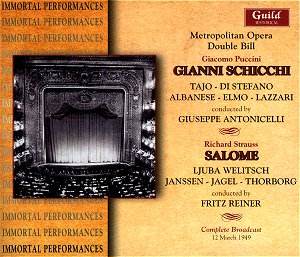Salome is a great play because it says things
to us that we would resist hearing if presented in simple scientific
discourse. It demonstrates the weakness of religion and the power of
sexuality separated from conventional ideas of love; these are messages
we donít want to hear, even though we already know them. So, Iím saying
that audiences have flocked to Salome for 100 years as a play
and an opera because they donít want to hear what it says? Yes, thatís
it. They need to hear it, but they donít want to. Straussí music amplifies
the play so perfectly that I believe one will find that the play itself
is hardly ever given now, but the opera is given frequently. Apparently
the version without music is now superfluous.
The only Puccini I have really liked is his last and
unfinished opera, Turandot. It is a good experience for a Pucciniphobe
for it demonstrates clearly his genius and how it worked. The first
act is sublime, one of the finest acts in all opera. The second act,
complete, but uneven. The last act is good right up to where the composer
died, and at that moment, where genius left and competence takes over,
as a work of art it dies and it is merely a talented working out, no
genius. Hence, in its lack, we can see in what that genius consisted.
One might, then, imagine my curiosity about Pucciniís next to the last
opera, Gianni Schicchi, the last work he actually completed and
had a chance to hear and repair and work over. On their faces one could
hardly consider two operas less alike, yet both Turandot and
Gianni Schicchi are absurd, allegorical, and both contain moments
of nobility, tragedy, and comedy, albeit in different amounts. Turandot
is more like Salome than it is like almost any other opera, so
this at first inexplicable coupling in this Met program may have an
undercurrent of symmetry after all.
I always listen to a new opera the way I got to know
opera in the opera house before surtitles ó making no attempt to follow
the dialogue, just listening through as though it were an orchestral
tone poem with parts for vocal instruments. Every great opera survives
this kind of listening successfully, and second or third rate opera
does not. A bad opera cannot be justified on the basis of its telling
a good story, and a stupid plot hardly disqualifies an opera from greatness,
e.g., Rigoletto.
The restored sound is quite good throughout, with clear
undistorted voices, little stage noise clutter, no crackle or scratch,
and relatively little congestion at the orchestral climaxes, but still
this is not a hi-fi recording, as we are most seriously aware in the
muddled orchestral climaxes in Salome. Welitschís voice and interpretation
are a wonder throughout, and anyone who knows and loves this opera must
have this version. We are captured by the drama and easily make allowances
for the sonic limitations. The side break occurs at 20.00, at Jochananís
ĎKomm dem Erwählten des Herrn nicht nahe!...í Jagel as Herod is
also a superb actor and fully engages Welitsch for the gripping drama
of the closing scenes. These days of sound characterisations singers
are expected to project their character entirely through the voice.
Kirsten Thorborg sounds enough like Welitsch that you canít tell Herodias
from Salome without following the text. Today this would be a big minus
in a recording; in 1949 it was probably considered good stage technique,
to merge the voices this way.
During this period engineers tended to turn the gain
up and down capriciously and in restoration an effort has been made
to repair this.
This release has also been reviewed
on Musicweb by Robert J. Farr who has knowledgeably discussed which
of the modern performances of Gianni Schicchi one might prefer.
But I think it is obvious that nobody would buy this release as their
only recording of either opera; this is for those who know the opera
and what to hear classic versions.
Paul Shoemaker

